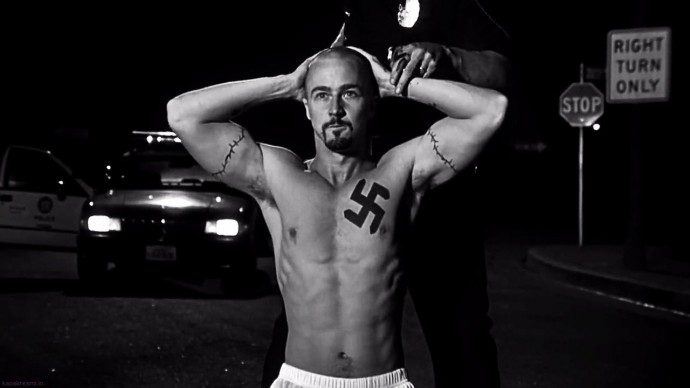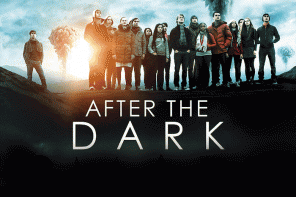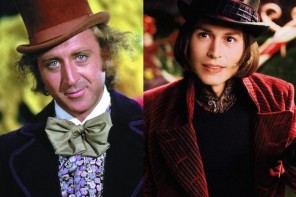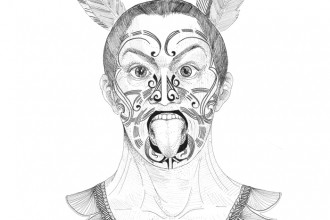American History X (1998) by Tony Kaye
American History X was released in 1998. It was written by David McKenna, and directed by Tony Kaye. American History X was his first feature film but he previously directed music videos for which he won two Grammy Awards. This movie deals with the topic of racism as its main character is a newly redeemed ex-neo-Nazi.
The scope of the filmmakers here is to denounce neo-nazism and racist ideologies in a whole. Though the intention of the filmmakers seems quite clear, the movie remains ambiguous, due to Kaye and McKenna’s clumsiness. Well at least I hope that’s that and not because one of them has some fucked-up ideology.
So let’s sum it up, which is not that easy because of the non-linear narrative of the film. This film tells the story of two brothers : Edward Norton as Derek Vinyard and Edward Furlong as Danny Vinyard. Their father who was a firefighter was killed by black gang members when they were younger. Shortly after that, Derek tumbled into a neo-Nazi movement in Venice Beach, California. His charisma and intelligence allowed him to grow more and more influential in this movement. One night he slaughters two black gang members who are trying to steal his car. He is then convicted for voluntary manslaughter to a three-years sentence. As he gets out of jail a redeemed citizen, he understands his younger brother is following the same path that he unsuccessfully took. He will thus try to prevent him from doing the same mistakes by enlightening his mind and showing him the true nature of neo-Nazis.
My opinion is that the political message of this film is too cheaply conveyed to be efficient. What are the means employed by this film to denounce racist ideologies ?
Let’s focus on Derek’s change first. As he is locked up in jail, he associates with other white supremacists in order to be safe. Yet he understands that their ideology is not as tight as his, since they deal narcotics with a Mexican gang member. His objections are ignored by the group and Derek then decides to get away from them. The members of the Aryan Brotherhood then beat him up and rape him in the shower. In addition, he gradually makes friend with a black inmate with whom he is working at the jail laundry.
Now how does he help his younger brother change his way of thinking ? Well he just tells him what happened in prison. It is as simple as that. For these two characters the giving up of their political commitment simply happens by realising how lousy and insincere and sadistic the people they fight with are. Though it is weak, this explanation is acceptable as far as the psychology of the characters is concerned. Indeed, we can understand that what attracts them is not just the ideology but more intensely the membership to a group, since they are socially and economically isolated. Nevertheless, this explanation is not enough on a rhetorical scale. That is to say, it may be enough for the characters but not for the audience : we understand why they give up neo-Nazism, but we are not explained how bad this ideology is : the argument that these ideas are defended by sadistic assholes is not enough, though it’s very probably true. This argument is made even weaker by the fact that Derek considers them as phony neo-Nazis.
Now this weak-ass rhetorics would not be a problem if the arguments of the white supremacists were not exposed with such glibness by Derek when we see him as a racist activist before his conviction. During these sequences, the Nazis are given a voice. Though their arguments are fucked-up, they are very articulate. They are given even more strength as their spokesman is Edward Norton, whose charisma meets no opposition. The few characters who try to stand up against him find themselves speechless when he is through talking.
There is not a single moment in the film at which his arguments are countered with words that bear a similar rhetorical efficiency. The only weapons that McKenna and Kaye could find were cheap emotions : the rape in jail, the final killing with the unbearably kitsch slow motion effects. Even on a more cinematic level, there is a gap between Norton’s image as a neo-Nazi and his image as his brother’s redeemer. When it comes to flash-back scenes, the image is in black and white and Tony Kaye’s cinematography is beautiful (in addition to directing the film he was also its director of photography).
We surely can not say this much about the scenes in colors, which are very dull. This difference has a negative effect on Norton’s charisma in this film : he seems much more charismatic as neo-Nazi leader with his bald head than as a redeemed citizen. Let me be clear, it’s not just about his looks, it’s also because of the change in his character : Derek as a fascistic jerk is a violent person, he speaks loud and hits hard; and when he gets out he is a guy who keeps his head down and seems hesitating, except in a few scenes. This may be quite a personal opinion but I think violence is an extremely efficient mean to gain fascination from the viewer, at least in movies. On this ground, Derek is much more fascinating, much more “bad-ass” in a way, as a white supremacist than as a citizen. He is scary but fascinating. This point is counter-balanced only by the looks of the other neo-Nazis in the film : the old harelipped leader (Stacy Keach as Cameron Alexander) and the obese dummy-looking henchman (Ethan Suplee as Seth Ryan).
Approaching the way the black characters are represented in this movie arouses another kind of discomfort. Let’s put aside the characters of the teacher and the inmate. On the first appearance of black people on the ball-play in the film, Danny’s voice-over describes them as trouble-making monkeys. The awkward feeling comes from the fact that the way this scene is shot seems to perfectly match his views : we are shown angry black mouths shouting at the foreground, exhibiting their teeth… Thus the way they are shot is very problematic. Yet the way white folks are shot on this same ball-play (with the noteworthy exception of Seth Ryan) is quite problematic as well. This reference might be a little far-fetched but the way Edward Norton is shown playing basket-ball reminded me of Leni Riefenstahl’s Olympia. In this pro-Nazi propaganda movie Riefenstahl tends to show in a particularly graceful way the muscles of the Aryan race. The slow motion shots used by Tony Kaye produce a similar (though much less impressive) effect on Norton’s body…
In a way of conclusion, I will deal with the ending of the movie, which seems to me a compelling “misfire” as Mick LaSalle from the San Franciso Chronicle named it. In the final scene, Danny, who is Derek’s brother for readers who did not remember, is shot by a black hoodlum in the toilets of his high school. This killing is supposedly the final lesson given to the viewer against racism : violence calls for violence. Nevertheless this ending is much more ambiguous than it tends to be : it almost gives reason to Danny’s racism in the end. If we just focus on why Danny gets shot in the end, it is not even because a few hours later he used to be a neo-Nazi punk (even if he eventually withdrew the white power posters from the walls of his bedroom) but because the day before he daringly stood up against three black hoodlums that were assaulting one of his classmates. So, according to your political views, you can see his death either as well-deserved painful lesson or as a martyrdom for the cause of white supremacy.
In the end, though this movie’s goal is to bring a tirade against white supremacist groups, it provides them with charismatic cinematic icons. The lesson is : when you tackle such a topic, you got to have a straight and thick case. If not, you might just harm your own cause.







